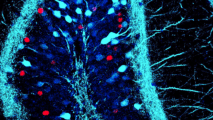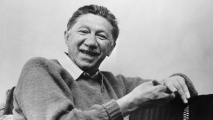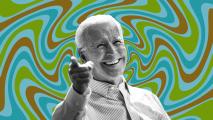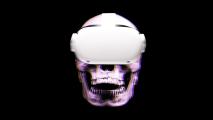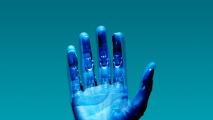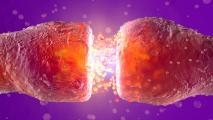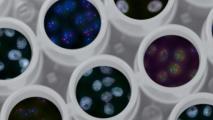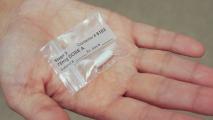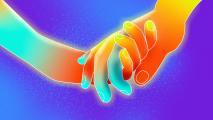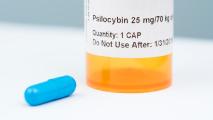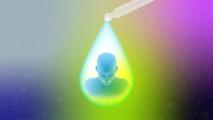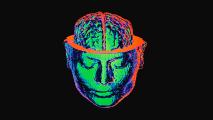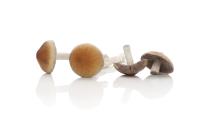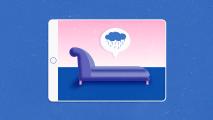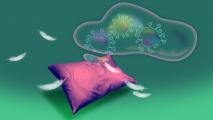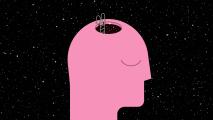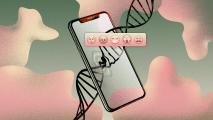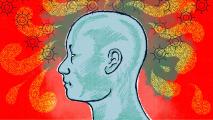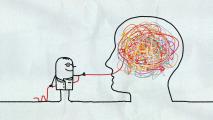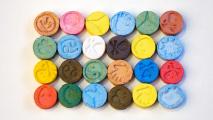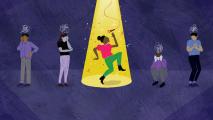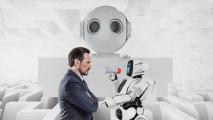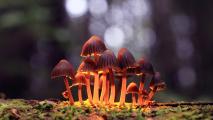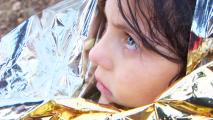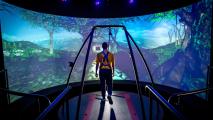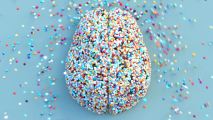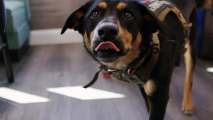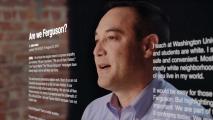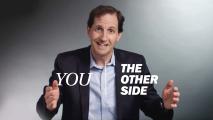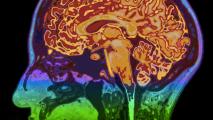Field: Psychology
Exercise boosts the brain — and mental health
New research is revealing how physical activity can reduce and even ward off depression, anxiety and other psychological ailments.
The science of habits
Whether you’re trying to break a bad habit or start a good one, psychologists have some tips to get you started.
How college in prison is leading professors to rethink how they teach
College in prison reduces the chance of reoffending, but it also dramatically changes the perspective of the professors who teach them.
Good and bad memories are stored in different neurons, study finds
Positive and negative memories are stored in different parts of the brain, raising the possibility of therapeutic memory manipulation.
New “risky” playground could make kids anti-fragile
A new playground in Melbourne’s Southbank is the work of artist Mike Hewson, who introduces "risk" back into play.
“Laughing gas” may offer quick, long-lasting relief from depression
With ketamine showing potential as an antidepressant, researchers investigate another anesthetic: nitrous oxide, or "laughing gas."
“Freakonomics” study offers simple strategy for making tough decisions
People who chose change over inaction, regardless of the decision, self-reported being better off and happier after six months.
The missing apex of Maslow’s hierarchy could save us all
In his later years, psychologist Abraham Maslow added a new apex to the pyramid of human needs: self-transcendence.
Withdrawal symptoms from antidepressants can last over a year
A scientific review found that withdrawal symptoms from antidepressants and antipsychotics can last for over a year.
Three reasons “you” won’t return after this life
Entire religions are constructed around theories of an afterlife, but former monk Stephen Batchelor lists three reasons you won't come back.
If you want people to like you, try talking more, not less
People tend to think they should speak less than half the time to be likable but more than half the time to be interesting.
Creatine, a popular exercise supplement, might help treat depression
Creatine shows promise as a treatment for depression, boosting the effects of SSRIs and potentially working as a standalone medication.
Are near-death experiences just psychedelic trips?
One possible explanation of near death experiences is that our brains are flooded with a hallucinogenic, DMT.
Identical twins were raised in different countries. Here’s how they differ today.
After being separated as toddlers, two identical twins were raised apart in the US and South Korea.
Americans are becoming more likely to cooperate with strangers, not less
Americans are more likely to cooperate with strangers today than they were in the 1950s, according to the American Psychological Association.
How to be happy: Aristotle’s 11 guidelines for a good life
In his Nicomachean Ethics, Aristotle proposed that humans are social, rational animals who seek to “live well.”
Procrastinating is linked to health and career problems – but here’s how you can stop
In the long run, procrastination isn’t an effective way of managing emotions and causes health and work setbacks.
This 20-year chart of depression diagnoses shows an incredible shift
People are being diagnosed with depression earlier than in the past because of a decrease in stigma and better diagnostic guidelines.
To make great changes in your life, follow the philosophy of kaizen
Kaizen asks us to make small changes, slowly and over time. It's a hard skill to master in an age of instant gratification.
An ancient technique can improve your attention span
Life's modern distractions, such as news and social media, have overwhelmed our evolutionarily designed attention spans.
Is your mind just a parasite on your physical body?
What if there is nothing special about self-awareness? What if it is just evolutionary dead weight, bound to disappear soon?
Mathematicians suggest the “37% rule” for life’s biggest decisions
Mathematicians tell us that, to maximize the chances of the best outcome, we ought to ditch the first 37% of any options.
The Biden administration is preparing for legal psychedelics within two years
The Biden administration’s Department of Health and Human Services has sent a memo supportive of psychedelic therapies. What does that mean for the field?
Your genes may impact psychedelic experiences
UNC researchers have found evidence that the genetic makeup of a crucial receptor may impact your psychedelic experience.
The 5-hour rule: How to turn a wasted day into a successful one
The 5-hour rule asks us to devote at least one hour a day to learning, experimenting, and reflecting. Here's how to make it work for you.
Widom of Daoism: why Yin-Yang is so much more than a tattoo
Yin-Yang symbolizes not a conflict or struggle but shows that nothing in life is solely either this or that.
Nurturing dads raise emotionally intelligent kids
Nurturing dads raise more emotionally intelligent children, helping make society more respectful and equitable.
VR exposure therapy app lets you face phobias on your own terms
Exposure therapy is a reliable technique for overcoming irrational fears, but it currently suffers high patient dropout rates.
The Four Enemies to a happy life and how to defeat them
Buddhist psychologists, Robert Thurman and Sharon Salzberg, have identified "Four Enemies" that are obstacles to a happy, fulfilled life.
Crows are self-aware just like us, says new study
Crows and the rest of the corvid family keep turning out to be smarter and smarter. A corvid's pallium has more neurons than a great ape's.
People who read live longer than those who don’t, Yale researchers say
A study by Yale researchers finds that reading books in particular returns cognitive gains that increase longevity.
Psychedelic research returns to Veterans Affairs
After decades, the Department of Veterans Affairs is once again investigating psychedelic therapies.
Do optimists really live longer? Here’s what the research says
Research shows if you cultivate a more optimistic mindset, you might further increase your chances for a long life.
Google has not created sentient AI — yet
Google can make AI seem sentient, but the AI has no understanding of what it is saying. But humans are easily fooled by conversational AI.
How the brain responds to surprising events
Unexpected outcomes trigger release of noradrenaline, which helps the brain focus its attention and learn from the event.
Magic mushrooms evolved to scramble insect brains, send them on wild, scary trips
Researchers discovered that the way fungi independently gained the ability to produce psilocybin is because of horizontal gene transfer.
Theory of mind: What chess and drug dealers can teach you about manipulation
Every social interaction is a game of chess, trying to get inside someone’s head to navigate what they are thinking or what they will do.
Geopsychology: Your personality depends on where you live
Scientists in the relatively new field of “geopsychology” are seeing links between personality and location.
How a healthy sex life can help minimize depression and anxiety symptoms
When you struggle with anxiety or depression, sex may be the last thing on your mind. But it can be a tool for well-being.
Babble hypothesis shows key factor to becoming a leader
Researchers show that intelligence is not the most important factor in leadership, simply talking the most is.
People trust AI fake faces more than real ones, research suggests
Fake faces created by artificial intelligence (AI) are considered more trustworthy than images of real people, a study finds.
Death: how long are we conscious for and does life really flash before our eyes?
Seeing one’s life flashing before one’s eye might be our ultimate attempt – however desperate – to find meaning in our lives.
AI maps psychedelic “trip” experiences to regions of the brain – opening new route to psychiatric treatments
To better understand how these effects manifest in the brain, we analyzed over 6,000 written testimonials of hallucinogenic experiences.
Clues to schizophrenia and bipolar disorder hidden in the dark genome
A new study suggests that the causes of these disorders are hidden in "dark genes," which may account for the enigma of their development.
Psychosomatic illness: Are some diseases caused by our memories?
The brain appears to remember immune responses, and memories can trigger them to happen again.
Therapy can relieve chronic back pain by rewiring the brain
A psychological treatment for chronic back pain left two-thirds of study participants with little-to-no pain after just one month.
IBS treatment app helps patients reprogram their minds
An IBS treatment app that facilitates cognitive behavior therapy helped trial participants manage symptoms and improve their quality of life.
MDMA for PTSD just crushed its phase 3 trial
Results from the first phase 3 trial of using MDMA for PTSD along with talk therapy found the drug to be effective.
Phase 2 trial finds psychedelic works as well as common drug
A small study has provided evidence of psilocybin for depression working as well as a popular SSRI.
How gratitude makes you more attractive
In partnership with John Templeton Foundation
New research shows that having an attitude of gratitude is key to healthy relationships, and it can virally impact society.
NYU is launching a center for psychedelic medicine
NYU’s Center for Psychedelic Medicine will serve as the nexus for the school’s psychedelic research, as well as provide training to budding researchers.
Oral ketamine treatment reduced suicidal thoughts: Pilot study
A new, small study in Australia suggests that oral ketamine treatment may help treat suicidal thoughts.
Mount Sinai is opening a psychedelic research center
A pacesetting institution, the Icahn School of Medicine at Mount Sinai is opening a psychedelic research center focusing on MDMA and trauma.
Want better science? Learn how to lie (with magic).
Some experiment designs need to deceive. These former magicians have some advice.
Your moral compass could be broken
In partnership with John Templeton Foundation
If we can better understand the evolution of our moral compass, psychologists believe we can begin working toward a society built on empathy over judgement.
Do apologies even matter?
In partnership with John Templeton Foundation
Science is finally proving that the act of apologizing can save and strengthen a relationship that’s been damaged by conflict.
Is free will an illusion?
In partnership with John Templeton Foundation
Philosophers have been making the claim that free will is an illusion for hundreds of years. What does modern neuroscience have to say about it?
App brings psychedelic-assisted therapy into your home
The Field Trip app aims to help people get some of the benefits of psychedelic-assisted therapy outside the confines of a clinic.
Remote therapy is as effective as face-to-face, for depression
The pandemic has therapists' couches off limits. A new study finds that remote therapy may be as effective for depression as face-to-face, so I gave it a try.
MDMA has long-lasting benefits as a PTSD treatment
The benefits of MDMA therapy as a PTSD treatment appear to last for at least a year, according to a newly published paper.
Can an app help you have better sex?
An app created by a sex therapist is helping couples learn how to have better sex by exploring their own desires and discovering their partner’s.
Psilocybin may impact your ego center
You’ve heard about “ego death” on magic mushrooms. New research suggests psilocybin curbs part of the brain that may tie in to ego.
The science behind your crazy pandemic dreams
If you’ve been having strange dreams and poor sleep during lockdown, you’re not alone. The anxiety-inducing pandemic, less activity, and more screen-time have many more people struggling with insomnia than usual.
New evidence of memory consolidation while we sleep
Thanks to brain implants, scientists have the first direct evidence of “offline replay” in humans, a process thought to be key to memory consolidation.
Reading your digital signature to detect depression, Parkinson’s
Digital phenotyping uses our smartphones to detect anything from Parkinson's disease to mental health disorders.
The case for love-enhancing drugs
Drugs don’t just affect the user; they shape relationships too. And a pair of bioethicists thinks we should consider them for relationship enhancement.
Reminiscence therapy is helping seniors at “dementia villages”
At a growing number of “dementia villages,” staff members use reminiscence therapy to help seniors return to a time when they felt happy and safe.
Series|
Dope Science
I use ketamine for depression – here’s how it works
Commonly known as a party drug, ketamine’s powerful effects on the brain have led doctors to further explore its medical potential. Now, the animal anesthetic is providing relief and hope for people with severe depression.
Intro to LSD
LSD, also known as acid, is a synthetic chemical that causes hallucinations, synesthesia, and sometimes, distress - the dreaded “bad trip.”
New PTSD therapy dulls the sting of painful memories
A Canadian researcher’s reconsolidation therapy is helping people overcome PTSD by allowing them to edit painful memories to be less emotionally impactful.
MDMA effects, risks, and rewards explained
MDMA, also known as Molly or Ecstasy, is a synthetic psychoactive drug. MDMA effects include enhanced pleasure and a heightened sense of touch and sound.
Improv for anxiety
In a judgement-free setting, improv requires the mind to focus on the present, providing natural anxiety relief for performers.
Ibogaine: The psychedelic cure?
Ibogaine, an African psychedelic drug which comes from the iboga plant, is used for both religious rites and drug addiction treatment.
Trash-talking robots get under our skin
Can robots control us? Probably not, but they can influence our actions, as this recent study on human-robot interaction by Carnegie Mellon shows.
Take a trip to Johns Hopkins' new psychedelic research center
Johns Hopkins is throwing its considerable clout behind the fast-growing field of psychedelic research, pouring $17 million into a research center to study the hallucinogenic drugs.
What wolves can teach us about human connection
Wolves are not often thought of as therapy animals, but Wolf Connections is changing that perception while helping young people in the process.
This child psychiatrist is saving refugees from trauma
With the right intervention at the right time, a trauma can be recorded in the memory as non-traumatic and in many cases the devastating effects of PTSD in children refugees can be avoided.
Is the future of therapy… virtual? A look into virtual reality therapy
The immersive world of VR may have therapeutic benefits for people combating phobias, anxiety, and PTSD.
Is autism a mysterious medical condition or part of the spectrum of human diversity?
Rethinking Autism: Interview with NeuroTribes Author Steve Silberman
Can people with autism help create next-generation AI?
Daivergent is a new startup that hires people with autism to train artificial intelligence - and helps them start independent careers.
The joy of being wrong
In partnership with John Templeton Foundation
Can practicing intellectual humility make us smarter and happier? Science says yes.
These hero pups are helping veterans and prisoners heal
Hero Pups is an organization providing support dogs for military veterans and first responders. Now, prison inmates are helping train them - with great results.
A day in the life of a 'violence interruptor'
Freethink followed Andre T. Mitchell, the founder of Man Up!, and his violence interrupter team for a day in...
Can cognitive behavioral therapy break the cycle of violence?
CBT is a promising way to reduce violence, so why has it been so hard to scale?
Steven Pinker makes the case for optimism
Are things really worse than ever, or are we missing the bigger picture?
Series|
Crossing the Divide
Having your views challenged is a good thing
When we encounter ideas we don’t like, we often shut them down. Professor John Inazu explains why that’s a bad thing and what we can do to fix it.
Series|
Crossing the Divide
The conservative radio host urging people to break out of their bubbles
Charlie Sykes, a conservative radio host and author of "How the Right Lost Its Mind", explains the dangers of...
Series|
Crossing the Divide
How to negotiate the nonnegotiable
Insights on working through conflict with Harvard's top negotiation expert.
Can a single conversation really change someone's mind? This research says yes.
After studying a team of canvassers, two researchers found that a single conversation can have a significant and...
This week in ideas: How to form good habits, the case against empathy, and a miracle cure derailed
From how to make good habits (and keep them) to a crisis at the NIH, it's a new edition of our week in ideas.



